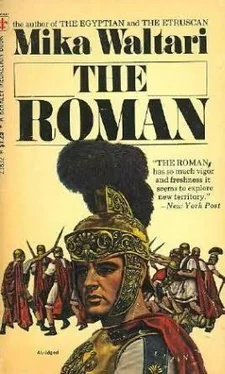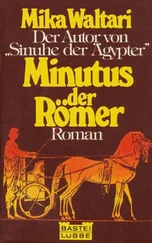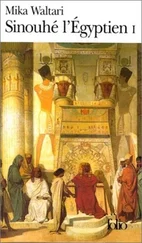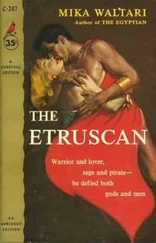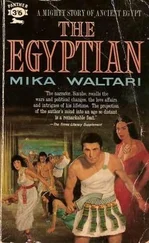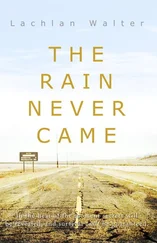Mika Waltari - The Roman
Здесь есть возможность читать онлайн «Mika Waltari - The Roman» весь текст электронной книги совершенно бесплатно (целиком полную версию без сокращений). В некоторых случаях можно слушать аудио, скачать через торрент в формате fb2 и присутствует краткое содержание. Жанр: Исторические приключения, на английском языке. Описание произведения, (предисловие) а так же отзывы посетителей доступны на портале библиотеки ЛибКат.
- Название:The Roman
- Автор:
- Жанр:
- Год:неизвестен
- ISBN:нет данных
- Рейтинг книги:4 / 5. Голосов: 1
-
Избранное:Добавить в избранное
- Отзывы:
-
Ваша оценка:
- 80
- 1
- 2
- 3
- 4
- 5
The Roman: краткое содержание, описание и аннотация
Предлагаем к чтению аннотацию, описание, краткое содержание или предисловие (зависит от того, что написал сам автор книги «The Roman»). Если вы не нашли необходимую информацию о книге — напишите в комментариях, мы постараемся отыскать её.
The Roman — читать онлайн бесплатно полную книгу (весь текст) целиком
Ниже представлен текст книги, разбитый по страницам. Система сохранения места последней прочитанной страницы, позволяет с удобством читать онлайн бесплатно книгу «The Roman», без необходимости каждый раз заново искать на чём Вы остановились. Поставьте закладку, и сможете в любой момент перейти на страницу, на которой закончили чтение.
Интервал:
Закладка:
The woman started violently, just as if she had only then noticed my arrival, and she looked up at me with her eyes glittering. She was young, and judging by her hair style, unmarried. Her face was not beautiful but rather irregular and coarse of feature. Her smooth skin was sunburned like a slave’s, her mouth large and her lips full.
“I’m learning the words of the holy rituals and I’m comparing them with each other in different books,” she snapped. “It’s not funny.”
Despite her bad temper, I had a feeling that she was as shy of me as I was of her. I noticed her hands were blackened with ink and that she was making notes with a leaky pen on a papyrus. One could see from her handwriting that she was used to writing but the poor materials blurred her script.
“I assure you I’m not laughing,” I hastened to say, smiling at her. “On the contrary, I am full of respect for your learned occupation. I don’t wish to disturb you in any way, but I’ve promised my father to read this book. Of course I shall not understand as much of it as you, but a promise is a promise.”
I had hoped she would ask me who my father was so that I could ask after her name. But she was not as inquisitive as that. She looked at me as one looks on a troublesome fly, then poked among the heap of scrolls at her feet and handed me the first part of the book.
“Here you are,” she said. “Take it and leave me in peace from your advances.”
I flushed so violently that my face burned. The girl was certainly mistaken if she thought I had trumped up an excuse to get to know her. I took the scroll, went over to the reading-window on the other side of the room and began to read with my back to her.
I read as quickly as possible without attempting to try to memorize the long list of names. Claudius evidently considered it necessary to enumerate from whom and how he had received every piece of information, what other people had written about it and what he himself considered to be the case. I did not think I had ever before read such a finicky and tedious book. But at the time when Timaius had ordered me to read the books he liked, I had learned to read swiftly and to memorize a few things that interested me. I used to cling stubbornly to these when Timaius later questioned me on the contents of the book. I thought I would read this book in the same way.
But the girl would not let me read in peace. She sat tittering to herself and sometimes swore aloud as she rustled the scrolls. In the end she tired of constantly sharpening her useless pen, broke it in half and stamped her foot in a rage.
“Are you blind and deaf, you horrible boy?” she cried. “Go and get me a proper pen at once. You must be very badly brought up if you can’t see I need one.”
My face burned again and I was annoyed, for the girl’s own conduct did not exactly point to a good upbringing. But I did not want to quarrel with her over the scrolls just as I had finished the first one. So I controlled myself and went to the librarian and asked for a spare quill. He muttered that according to the library rules, quills and paper for notes were free, but that no citizen was so poor that he had the nerve to take a pen without paying. Angrily I gave him a silver piece and he happily handed me a bundle of pens and a scroll of the worst paper. I returned to the Claudius room where the girl snatched the pens and paper out of my hand without even thanking me.
When I had finished the first book, I went back to her and asked her for the second.
“Can you really read so quickly?” she asked in surprise. “Do you remember anything of what you’ve read?”
“At least I can remember that the Etruscan priests had a deplorable habit of using poisonous snakes as throwing weapons,” I said. “I’m not surprised that you’re studying their customs and habits.”
I had a feeling she was already regretting her behavior, for in spite of my nasty remark she humbly handed me a quill and like a little girl, said, “Would you mind sharpening my quill for me? I don’t seem to be able to do it. They start leaking almost at once.”
“That’s because of the poor paper,” I explained.
I took her pen and knife, sharpened and carefully split the point for her.
“Don’t press so hard on the paper,” I said, “or you’ll get a blot at once. If you’re not too rough, it’s quite easy to write even on bad paper.”
She gave me a sudden smile, like lightning in dark stormy clouds.
Her strong features, wide mouth and slanting eyes looked suddenly lovely, such as I could never have believed before.
When I remained standing, staring at her, she grimaced, stuck her tongue out and snapped, “Take your book and go away and read, since you think it’s such fun.”
But she still kept disturbing me, coming over and asking me to sharpen her pen again, so that my fingers were soon as black as hers. The ink was so lumpy anyhow that she cursed her inkstand several times.
At midday she took out a bundle, opened it and began to eat greedily, tearing off long strips of bread and taking huge bites out of a country cheese.
When she noticed my look of disapproval, she began to make excuses.
“I know perfectly well you’re not allowed to eat in the library,” she said, “but I can’t help that. If I go out, I get pushed about and strange men follow me and say shameless things because I’m alone.”
She paused and then, with her eyes lowered, she added, “My slave is coming to fetch me in the evening when the library closes.”
But I soon realized that she did not even have a slave. Her meal was simple and she presumably had no money for pens and paper which was why she had commantled me so haughtily to fetch her a pen. I felt baffled, for I did not wish to offend her in any way. But I also felt hungry when I saw her eating.
I must have swallowed, for her voice suddenly softened.
“Poor boy,” she said. “You must be hungry too.”
She generously broke the bread in half and also handed me her round cheese so that we could bite from it in turn, and the meal ended before it had really had time to begin. When one is young everything tastes good. So I praised her bread.
“That was real country bread and the cheese was a fresh country cheese, too. You can’t get those in Rome every day.”
She was pleased with my praise.
“I live outside the walls,” she said. “If you know where Gaius’ circus is and the burial ground and the oracle, then it’s in that direction, behind Vatican.”
But she still would not tell me her name. We went on with our reading. She wrote and mumblingly repeated by heart several old texts which Claudius had written about in his book on the holy scripts of the Etruscans. I read one part after another and memorized everything about the wars and warships of the city of Caere. In the evening the room grew dark as the shadow of Palatine fell over the window. The sky had also clouded over,
“We mustn’t ruin our eyes,” I said finally. “Tomorrow is another day, but I’m already tired of this moldy old history. You, who are an educated woman, would be able to help me and note down briefly what is in the parts I haven’t read, or at least what the most important things in them are. My father has property near Caere, so he’ll probably question me on everything Emperor Claudius says about the history of Caere. Please don’t be offended at the suggestion, but I feel like having some hot sausage to eat. I know a place and would like to invite you, if you will help me.”
She frowned, rose and looked at me so closely that I could feel her warm breath on my face.
“Don’t you really know who I am?” she asked suspiciously, and then went on at once: “No, you don’t know me, and you meant no harm. You’re just a boy.”
Читать дальшеИнтервал:
Закладка:
Похожие книги на «The Roman»
Представляем Вашему вниманию похожие книги на «The Roman» списком для выбора. Мы отобрали схожую по названию и смыслу литературу в надежде предоставить читателям больше вариантов отыскать новые, интересные, ещё непрочитанные произведения.
Обсуждение, отзывы о книге «The Roman» и просто собственные мнения читателей. Оставьте ваши комментарии, напишите, что Вы думаете о произведении, его смысле или главных героях. Укажите что конкретно понравилось, а что нет, и почему Вы так считаете.
